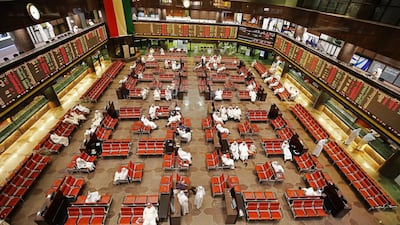Kuwait’s market regulator, the Capital Markets Authority, is putting its 50 per cent stake in Boursa Kuwait, one of the Arab world's oldest stock exchanges, up for sale on Tuesday when it opens subscription for an initial public offering.
The offer price is 100 fils (Dh1.20) per share and the subscription, which is limited to Kuwaiti nationals, will remain open for three months until December 1, the CMA said in a statement on Monday. The opening of the subscription is the second and final phase of the planned privatisation of Boursa Kuwait Securities Company.
The transaction is “an important step towards achieving the ambitious national development goals set out in Kuwait Vision 2035 with an aim to strengthen the country’s position as a regional financial centre and give the private sector a stronger role”, CMA chairman, Ahmad Al Melhem, said.
Read More
Boursa Kuwait expects two IPOs in next 12 months, acting CEO says
Why Kuwait's expected upgrade to Emerging Market status will be a boon
“Kuwait, home to the first stock exchange in the Gulf, will soon become home to the only stock exchange in the Gulf that’s 94 per cent owned by the private sector,” he said, adding that the move validates Kuwait’s reform policy and reflects the CMA’s commitment to upgrade the country's capital markets.
The IPO will make the bourse only the second listed exchange in the region after the Dubai Financial Market. It will be 50 per cent owned by citizens, 44 per cent by strategic investors, while the remaining 6 per cent will be controlled by the Kuwaiti government through the Public Institution for Social Security.
Kuwait's close to $100 billion (Dh367bn) stock market, which is similar in size to markets in New Zealand and Ireland, is currently the largest member of the MSCI’s main frontier gauge, but it is set to be upgraded to emerging market status in June next year. The upgrade has seen active managers buying Kuwaiti stocks ahead of anticipated passive inflows.
FTSE Russell announced Kuwait would be upgraded to its Emerging Markets Index (FTSE) in September 2017 and S&P Dow Jones granted emerging market classification in December 2018.
Boursa Kuwait expects as many as two initial public offerings from the services and finance sectors and two real estate investment trusts within the next 12 months, its acting chief executive Mohamed Al Osaimi, told The National in June.
The exchange is also looking to attract more companies from the petrochemicals sector, he said at the time.
MSCI, the world's largest index compiler, will upgrade Kuwait to its main emerging markets index by 2020, a reclassification that could attract $2.8bn of inflows from passive funds to its equities market. Kuwait will be the fourth country from the region after the UAE, Qatar and Saudi Arabia to be reclassified as an emerging market.

